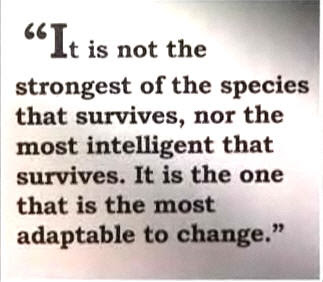Steven Pinker was on The Colbert Report discussing his genome. Here is the link for Canadians. Americans can watch the clip at www.colbertnation.com.
Draft Neanderthal genome sequence.
The draft genome sequence of Neanderthal is evidently more or less complete.
Click here to watch today’s press conference.
BioBus on Discovery Channel.
My colleague Alex Smith of the Biodiversity Institute of Ontario and Nick Jeffery, currently an undergraduate project student in my lab, were featured on tonight’s Daily Planet. Why? Because they ride around in the BioBus!

See the clip here (their segment starts at 13:05).
Note: the segment before theirs, which begins at 8:55 and includes Sean Carroll, refutes the myth about Darwin’s finches instigating his evolutionary views (replacing them with mockingbirds), but presents an apparently misattributed “Darwin quote”.
Sweeeeeet…
What I’m wearing for Darwin Day.
Even though I am only really photogenic in person, I decided I ought to post a photo of what I am wearing today on Darwin Day. It’s by a relatively unknown young designer named, um, me. Available here.
The Coyne paradox.
From everything I have heard, Jerry Coyne’s new book Why Evolution is True is very good. I haven’t read it yet (it is on my list), but I am willing to assume that the reviews have been reliable and that he makes a superb case for the fact of evolutionary descent.
What I don’t understand is the consistent contradictions that seem to come up whenever I encounter his writings. For example…
- He co-authors a very useful book on Speciation and is considered an expert on the topic. But the book includes almost nothing about punctuated equilibria (i.e., one of the major issues with regard to patterns of speciation in the fossil record), and he even misconstrues it as saltationist.
The idea of macromutational hopeful monsters, or “saltations,” had a prominent resurrection in 1980 when Stephen Jay Gould, as part of his and Niles Eldredge’s theory of punctuated equilibrium, proposed that macromutations could explain the “jumps” in the fossil record. After getting a severe drubbing from geneticists, Eldredge and Gould retreated in 1993, claiming that they never suggested the idea of saltations. [See rebuttals here and here]
- He writes a book about the evidence for evolution, but he also was one of the people responsible for undermining the peppered moth example in a strange book review.
Until now, however, the prize horse in our stable of examples has been the evolution of ‘industrial melanism’ in the peppered moth, Biston betularia, presented by most teachers and textbooks as the paradigm of natural selection and evolution occurring within a human lifetime. The re-examination of this tale is the centrepiece of Michael Majerus’s book, Melanism: Evolution in Action. Depressingly, Majerus shows that this classic example is in bad shape, and, while not yet ready for the glue factory, needs serious attention. [See Majerus’s paper in E:EO about this]
- He is a vocal critic of creationists, but he also defends the use of their favourite term “Darwinism”. Biologists rarely use it anyway (because, as I and many others feel, it is misleading both historically and scientifically), so this can only provide benefit to anti-evolutionists. He also doesn’t seem to grasp that it’s not that eliminating the term would cause creationists to vanish, it’s that they would no longer have the (let’s face it, effective) tool for persuading non-scientists that evolution is an ideology based on one man’s teaching.
Happy Darwin Day — Remember, it’s not just about Darwin.
Happy Darwin Day!
By which I mean, Remember one of the greatest scientists who ever lived AND all the accomplishments of the thousands of scientists who have come after him and made modern evolutionary biology the great success that it is.
To me, this is not unlike celebrating nation-founding anniversaries (July 4 in the US, July 1 in Canada, etc.). You’re not just celebrating a single act of signing some document, you’re especially celebrating everything that has come since.
 So, enjoy Darwin Day. Give the man his due. But remember that Darwin Day isn’t all about Darwin and it isn’t all about the day. (It isn’t just about Darwin Year, either).
So, enjoy Darwin Day. Give the man his due. But remember that Darwin Day isn’t all about Darwin and it isn’t all about the day. (It isn’t just about Darwin Year, either).
Oh, and don’t forget to get some Darwin Year gear.
Cosmos on Darwin.
Domestication.
Those of you who have read Darwin will know that he had a strong interest in domestication and artificial selection. People have argued about how important this was in his development of the idea of natural selection, but there is no doubt that it was at least relevant in his explanation of the mechanism. It is the first topic he discusses in the Origin, and the only subject that he meant to cover in greater detail that he actually returned to in a later publication (the two-volume The Variation of Animals and Plants under Domestication, 1868).
I wrote a paper about domestication and what it can teach us about natural selection for the recent issue of Evolution: Education and Outreach, and I now see that Michael Purugganan and Dorian Fuller have authored a paper on this topic for the Feb. 12 issue of Nature (Darwin Day). I didn’t know about their paper, so it isn’t cited in my article, but I can at least give a link below. Another one that I learned about too late but which is recommended is by Melinda Zeder from a couple of years ago.
Gregory TR. 2009. Artificial selection and domestication: modern lessons from Darwin’s enduring analogy. Evolution: Education and Outreach 2: 5-27.
Purugganan MD and Fuller DQ. 2009. The nature of selection during plant domestication. Nature 457: 843-848.
Zeder MA 2006. Central questions in the domestication of plants and animals. Evolutionary Anthropology 15: 105-117.
For many more, see the references cited in my paper.
Jerry Coyne on Darwinism.
It’s great to know that Jerry Coyne has a blog — I certainly plan to read it and you should too.
However, I have to confess that I tend not to agree with him on a lot of points. His criticism of evo-devo, his opinion that punctuated equilibria is saltationist, and his apparent belief that there is nothing new under the sun in evolutionary biology that is worth getting too excited about.
I also disagree that “’Darwinism’†is a compact, four-syllable term for ‘modern evolutionary theory’â€. No, it isn’t. It may be a synonymn for “adaptive change due to the process of natural selection”, but even that would be stretching it. There is a LOT in modern evolutionary theory that is well outside anything Darwin considered, and thus is not “Darwinism” in any sense. Genetic drift, everything to do with mutation, allopatric speciation, mass extinctions, developmental regulatory genes, genome duplication, population genetics, the list goes on. There is also a lot that Darwin considered, including use and disuse, pangenesis, and other components of what should also be included in “Darwinism”, that are not part of evolutionary theory.
I repeat the advice given by Scott and Branch for historic, scientific, and practical reasons: Don’t call it “Darwinism”.
________
UPDATE: See also Larry Moran‘s thoughts.


